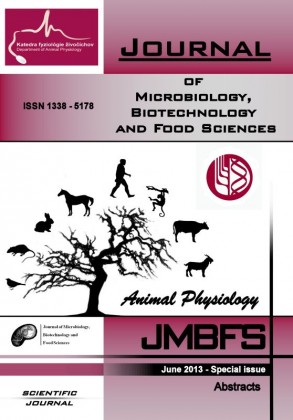THE COMPARISON OF SUSCEPTIBILITY OF CHICKEN AND DUCK EMBRYOS TO CADMIUM DURING IN OVO EXPOSURE
Keywords:
Abstract
Cadmium gives a real threat for living organisms due to its enhancing environmental contamination, a unique ability to bioaccumulation and multidirectional toxic effects. All birds are exposed to cadmium in their natural habitats, but in the case of water fowl the exposure seems to be much higher as a result of the contact with polluted bottom sediments. It is confirmed that reproductive disturbances of wild waterfowl have this etiology and avian eggs are considered to be sensitive indicators of heavy metal contamination in environmental monitoring.The aim of this study was to compare the effect of cadmium injected in ovo to chicken and Muscovy duck eggs for hatching results and lysosomal hydrolases activity in blood plasma of one-day hatchlings. Cadmium was injected on day 4 of incubation to hens egg in the increasing dose ranging from 0 to 24 µg per egg. For ducks eggs, the injection was done on day 6 of incubation with doses 0-30 µg per egg (recalculated into higher egg weight).
The results obtained indicate that cadmium ions applied in ovo at the dose 3 µg per egg were embryotoxic for hens embryos and markedly reduced hatchability (20%) as compared to the control group (45%). In ducks, the significant adverse effect of cadmium was observed for the dose 7.5 µg per egg which reduced hatchability from 52.3% observed for control group to 31,9% (P<0.05). In both birds species cadmium induced significant changes in lysosomal hydrolases activity in blood plasma and the greatest differences for N-acetylglucosaminidase, β-mannosidase and arylsulphatase were observed. Compared to the control group, in the blood serum of chicks from the group receiving 3 µg Cd per egg N-acetylglucosaminidase activity increased by 79% (P≤0.05) whereas for ducklings a weaker non-significant increase (by 22%) for the same dose was observed. The results seem to indicate a species-specific differences in susceptibility of birds embryos to cadmium.
Downloads
Downloads
Published
2013-06-06
How to Cite
M., D., M., L., K., G., M., D., & J.W., N. (2013). THE COMPARISON OF SUSCEPTIBILITY OF CHICKEN AND DUCK EMBRYOS TO CADMIUM DURING IN OVO EXPOSURE. Journal of Microbiology, Biotechnology and Food Sciences, 2(Abstracts special issue), 2–3. Retrieved from https://office2.jmbfs.org/index.php/JMBFS/article/view/7510
Issue
Section
Biotechnology
License
Copyright (c) 2013 Dżugan M., Lis M., Głodek K., Droba M., Niedziółka J.W.

This work is licensed under a Creative Commons Attribution 4.0 International License.
All papers published in the Journal of Microbiology, Biotechnology and Food Sciences are published under a CC-BY licence (CC-BY 4.0). Published materials can be shared (copy and redistribute the material in any medium or format) and adapted (remix, transform, and build upon the material for any purpose, even commercially) with specifying the author(s).

